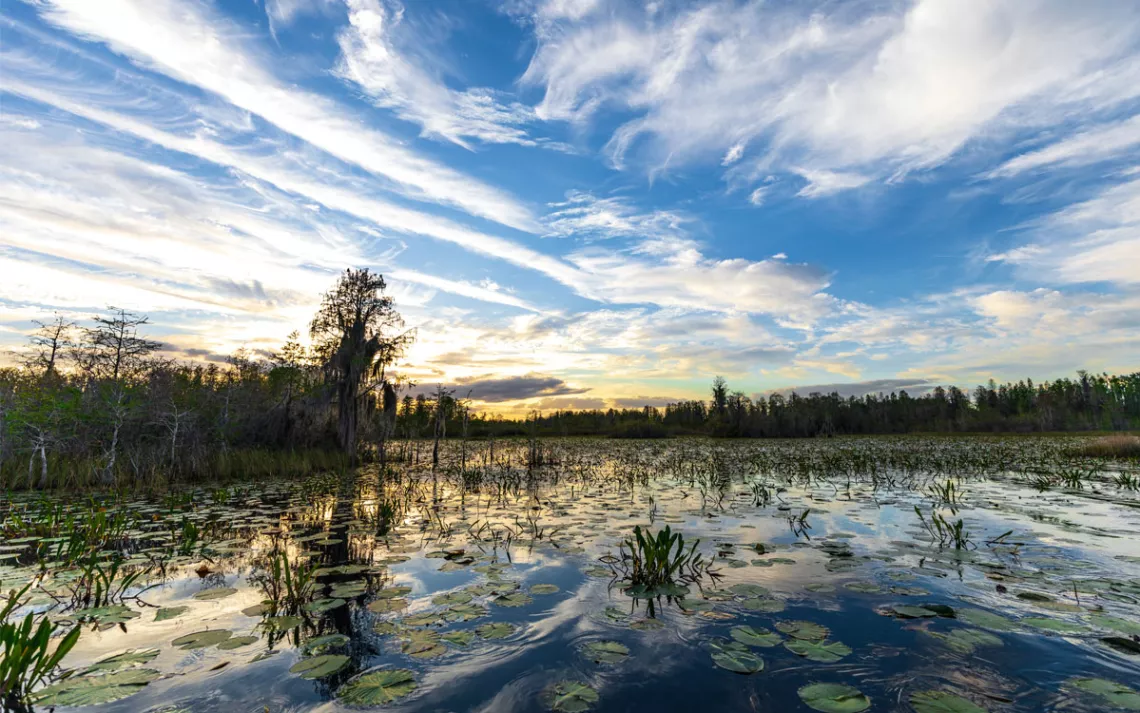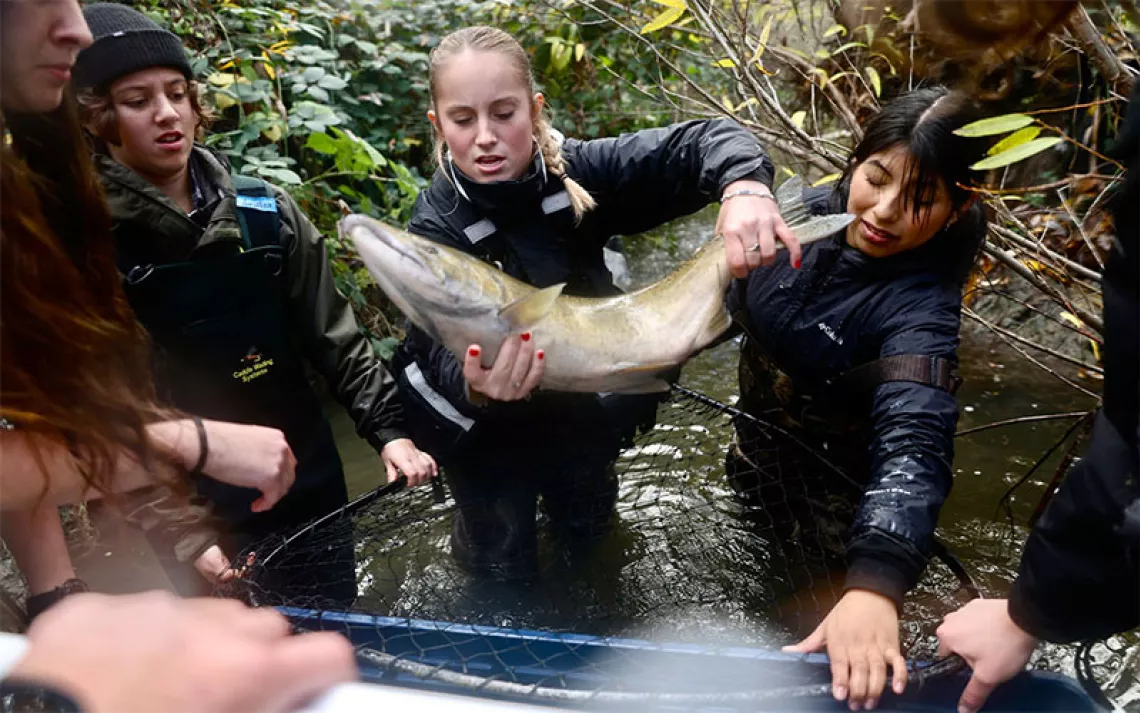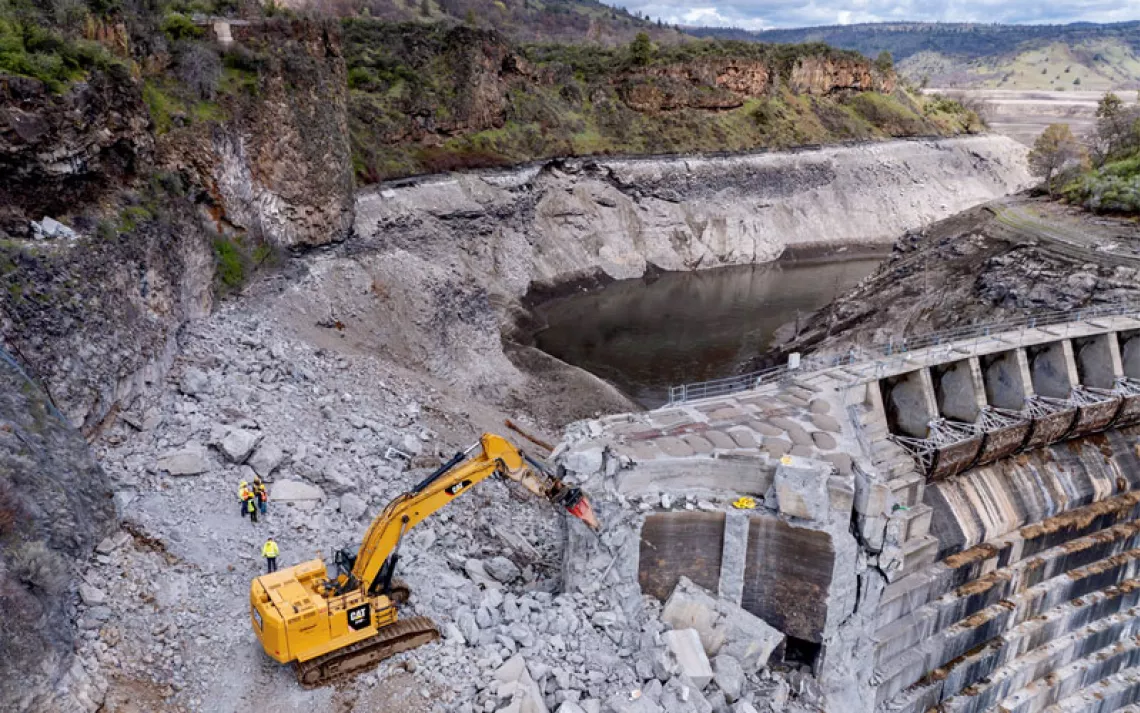Opposition to Proposed Mining Near Rare Protected Georgia Swamp Grows
Advocates mount last-ditch effort to save the Okefenokee National Wildlife Refuge from a titanium mine

Okefenokee Swamp | Photo by J. Michael Jones/iStock
The Okefenokee Swamp in southeastern Georgia is the largest intact blackwater swamp in the world. Hundreds of species and rare plants call this 640-square-mile area home, but for the past five years, an Alabama mining company has been trying to extract titanium near a sensitive, protected area called Okefenokee National Wildlife Refuge. For decades, environmentalists have worried that mining could threaten the refuge. Now, they, along with several former Georgia regulators and scientists, are mounting a last-ditch effort to save the refuge as the state's environmental agency considers approving the mining project.
The Okefenokee Protection Alliance, a coalition of more than 40 state and national organizations, has repeatedly raised concerns that the mine would increase the frequency of droughts and wildfires. This is because the mining company, Twin Pines Minerals, plans to withdraw 1.4 million gallons of water from the area’s aquifer every day, and experts say that could lead to lower water levels. If these conditions dry out Okefenokee Swamp’s peat deposits (partially decayed organic matter), they could release 28 million tons of carbon dioxide into the air.
To avoid this fate, groups like Georgia State University’s Student Public Interest Research Group have mobilized to educate the public and get people to submit comments opposing the project. “I spent my spring break canvassing around the Metro Atlanta area telling people about the threat that the Okefenokee is facing right now,” Caleb Gustavson, an organizer with the student-run organization, said. “I decided to canvass because I had always grown up hearing about the beauty and importance of the Okefenokee Swamp, and I wanted to work as hard as I could to try and save it.”
While the Okefenokee is a national refuge, Trump-era changes narrowed the definition of which bodies of water fell under the purview of the Clean Water Act. The Army Corps of Engineers briefly had control of the review process after learning that the Muscogee (Creek) Nation had not been consulted on how the mine would impact the tribe’s historic burial grounds. However, the corps later relinquished federal oversight of the project.
Now the Georgia Department of Natural Resources’ Environmental Protection Division is in charge of issuing the permits that would allow Twin Pines to operate. The state agency opened a public comment period to receive feedback on the project’s draft permits in February, and it has already received over 60,000 comments. Members of the Okefenokee Protection Alliance aim to gather enough comments telling the EPD to deny these permits before the April 9 deadline to end the years-long fight against the mine.
Whereas some organizers are set on generating comments, scientists like professional geologist Kristen Ritter Rivera have been rallying colleagues to speak out against the mining operation. On March 25, Rivera—herself a former employee of Georgia’s Environmental Protection Division—sent a letter expressing concern about the proposed mine. Rivera penned the letter, which was cosigned by a dozen other geologists (among them fellow former EPD employees) after they learned that Twin Pines had been fined $20,000 for violating Georgia’s Water Well Standards Act. The mining company allegedly drilled hundreds of exploratory boreholes in Charlton County without the correct documentation and conducted work without a professional engineer or professional geologist. While these incidents reportedly occurred in 2018 and 2019, the Georgia environmental agency issued the consent order on January 4, 2024, indicating that it had been unaware of Twin Pines’ violations for years.
“The purpose of the act’s rules governing exploratory drilling—specifically the supervision by a professional geologist—is to ensure the integrity and reliability of the data collected and submitted by the permit applicant,” the geologists’ letter reads. “In this instance, TPM’s failure to properly supervise 86 boreholes, or over 22 percent of its initial exploratory drilling program, raises serious questions as to the integrity of that data.”
For its part, the state agency has appeared to ignore these findings. Sara Lips, the director of communications and community engagement at the Georgia agency, said the consent order “does not have an implication to the modeling assessments,” so the agency did not amend the modeling process after these violations were discovered.
Underscoring the threats that a mine would pose to the swamp ecosystem, the US Fish and Wildlife Service spoke out against the project several times. In January, the federal agency asserted legal rights over the area’s water using Federal Reserved Water Rights, which allocates specific amounts of water to tribal and federal lands. It’s a move that could block Twin Pines’ plans. But environmental lawyer Joshua Marks said this would be a challenge, as that water rights rule has never been applied in the eastern United States before.
The federal wildlife agency also previously sent a letter stating that Twin Pines’ assessments of the mine’s potential impacts on the Okefenokee National Wildlife Reserve were flawed. This letter came one month after a group of hydrologists wrote to the EPD to say that the agency had been using data from the wrong location to determine whether the mine would lower the swamp’s water levels. Despite the strong pushback from the federal government and independent scientists, the Georgia agency has remained steadfast in insisting the project won’t interfere with the swamp or the surrounding environment. Representatives from the agency informed Sierra that the FWS letter would be considered along with all the other comments once the public comment period closes next week.
Both Rivera and Marks said this permitting process stood out from those they’d seen before, and Marks pointed to the fact that the EPD director is appointed by the governor. Governor Brian Kemp has reportedly received thousands of dollars in campaign contributions from Twin Pines and its leadership. “Why has EPD used faulty analysis and ignored repeated company wrongdoing? Because it is a political, not regulatory agency at heart,” Marks said.
Marks told Sierra that the public comment period could be crucial for the fate of this project and the protection of the Okefenokee Swamp, which some advocates hope will be a UNESCO World Heritage Site. “Governor Kemp will be faced with a stark choice: continue siding with an Alabama mining company with an atrocious track record and a multimillionaire landowner who wants to put his personal fortune ahead of everyone else … or side with the science, the law, and the overwhelming will of the public who want him to protect Georgia’s greatest natural treasure,” Marks said. “Hopefully he makes the right choice.”
 The Magazine of The Sierra Club
The Magazine of The Sierra Club



